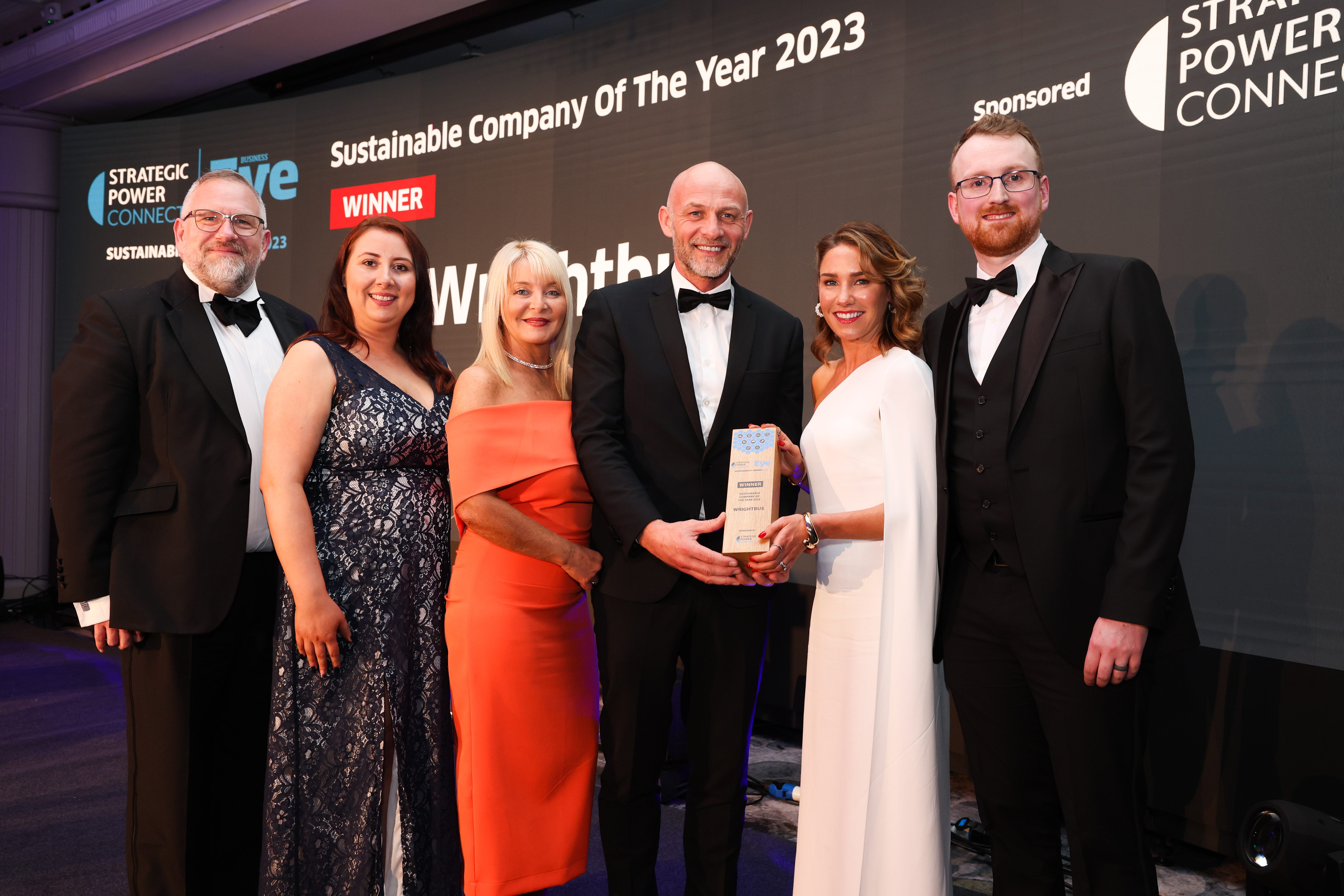

Friday, 24 February 2023
Some of Northern Ireland’s most innovative companies showed how they are tackling the climate crisis at the inaugural Business Eye Sustainability Awards in association with Strategic Power Connect in February.
The headline awards saw Wrightbus and The Boatyard Distillery picked up the Sustainable Company of the Year titles in the larger and smaller business categories, while Ian Henry, a director of Magherafelt-based building company Henry Brothers, was named as the Sustainability Business Leader of the Year.
The extent to which companies and individuals such as these, and the other winners on the night, have embedded sustainability in their businesses is testament to their commitment to creating a greener future for all, Paul Carson, founder of Strategic Power Connect.
“We’ve been so incredibly impressed not just by the sheer quantity of entries, but by the quality and the innovation embraced by Northern Ireland companies to safeguard their organisations and our futures,” he said. “I’ve personally found being involved in these awards to be an uplifting experience at a time where it’s easy to get beaten up and daunted by extreme changes.
“Reviewing the entries has been a real pleasure and has given me a lot of optimism for the future.”
Embedding sustainability in businesses is something which Strategic Power Connect focus on on a daily basis.
Strategic Power Connect helps businesses to decarbonize their energy consumption and reduce their scope 2 emissions, those associated with the purchase of electricity and other forms of energy.
It does that by offering direct renewable energy solutions to commercial and industrial businesses as an outright sale or via an Energy Supply Agreement (ESA) funding option. It is also able to deliver a full-service capability including, sales, design, installation and maintenance.
The ability to quickly decarbonise a process is one of the main benefits of SPC’s offering, an aim which companies in all sectors and all regions are striving for and one which is quickly becoming a necessity as regulators implement stricter emission restrictions.
As important in today’s inflationary environment is the need to keep control of costs, something which SPP are able to maintain by offering fixed prices for the energy produced on site. Such certainty allows users to plan for the future more accurately while avoiding spikes in energy prices, such as those witnessed during and after the Ukraine war.
The latter factor has also raised concerns about security of supply, something which is key for large energy users. By producing renewable energy on site, SPP’s offering negates any security of supply issues and removes unneeded worries for users.
“Energy provenance is a very rewarding thing,” Paul Carson said. “As a company, to be able to look out your window and see your own tangible energy source, powering your business with green energy, we wonder why we haven’t been doing it all along.”
Adding further to the SPC offering is the fact it can be implemented without any capital expenditure, easing worries about the need to raise finance or other to fund such a project.
“The offering is a game changer for all large energy users, not just from a sustainability angle but also offering cost savings and security and provenance of supply,” Paul Carson said. “All three of these factors have grown in prominence for users in the last few years and will accelerate further in the future.”
Certainly, that is true of sustainability, the core around which SPC is built and the reason the firm is embedded in industry and felt sponsorship of the Business Eye Sustainability Awards was key, particularly given the urgency to decarbonise.
“Time is most definitely against us,” Mr Carson said. “To meet our 2030 target we need to get sufficient renewable capacity through the planning system by 2027. We have four years to double our renewable capacity.”
The winners of the awards are most definitely showing a sense of urgency.
Other companies which took home prizes on the night were The Royal Maternity Hospital complex in Belfast which won the Built Environment Project award for the GRAHAM-BAM Partnership and Musgrave Northern Ireland which was recognised as the Sustainable Retail Business of the Year.
Coca-Cola HBC, based outside Lisburn, took the top award in the Sustainable Food & Drink Company category while the innovative Salthouse Hotel in Ballycastle came out on top amongst the Tourism & Hospitality contenders.
Meanwhile, concrete product makers Tobermore won the Sustainable Manufacturing Business of the Year title while Translink took the top prize in the Sustainable Project of the Year category for its zero emission bus programme.